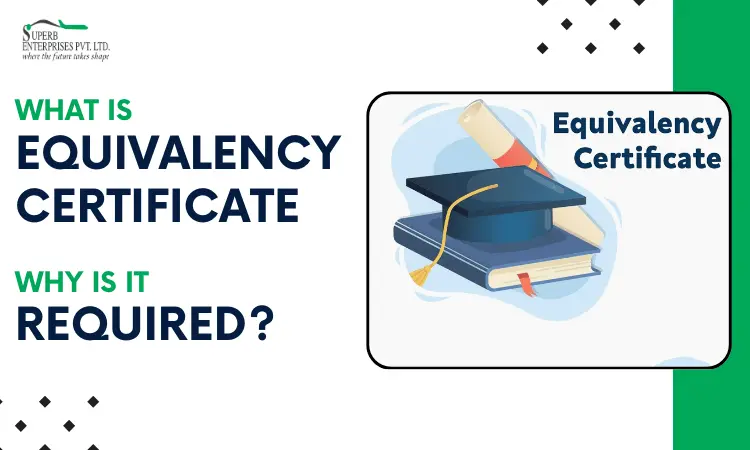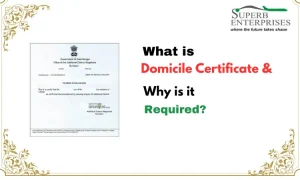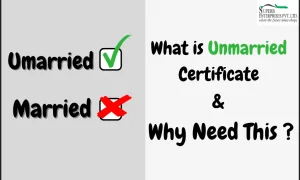The equivalency certificate plays a key role in bridging the gap among the different boards of education and in the standards of professionalism that are widespread throughout the globe.
An Indian equivalency certificate simply certifies that one’s educational or professional qualification acquired in India is equivalent to foreign education.
An equivalency certificate is usually presented by a person migrating abroad to pursue higher education, a professional career, or to immigrate.
In this blog, we have discussed everything you could wish to know about what is equivalency certificates, types, and importance to its uses and future implications, we have it all covered. Read on to learn all about the equivalency certificate.
Read This – What is a Matriculation Certificate
What is Equivalency Certificate?
In simplest terms, an equivalency certificate is a document issued to students who have studied in international institutions and wish to work or continue further studies in a different country.
This certificate clearly states that a student’s foreign degree meets the educational criteria of the destination country.
For example, if you study in an internationally recognized university or college then you need to obtain an equivalency certificate issued by the Association of Indian Universities (AIU).
This certificate is crucial for students to secure admission to Indian universities for further education and may even be necessary to secure employment opportunities.
Equivalency certificates facilitate the transfer of skills and knowledge from one part of the world to another. Equivalency certificates for a student aiming to study abroad, a professional putting forward the idea of working in some other country, or an immigrant trying to settle down in a foreign country, are crucial.
Hence, knowing the process of obtaining an equivalency certificate is the answer to a smooth transition in any educational or professional journey.
The Process of Obtaining an Equivalency Certificate
Obtaining an equivalency certificate involves several steps, each of which is crucial to ensuring that your qualifications are recognized in another country. Here’s a step-by-step guide to the process:
- Research Requirements – The first step is to understand what documents and qualifications need to be evaluated. Different countries and institutions have varying requirements, so it’s important to identify what is needed for your specific situation.
- Choose the Appropriate Authority – Once you know the requirements, you need to find the right agency or organization that issues equivalency certificates. Some of the well-known organizations include World Education Services (WES) in the USA, NARIC in the UK, AIU in India, and ICAS in Canada. These organizations evaluate your qualifications and determine their equivalence to local standards.
- Submit Required Documents – After choosing the right authority, you must gather and submit all necessary documents. These typically include transcripts, diplomas, certificates, and sometimes, letters of recommendation or proof of work experience. It’s important to ensure that all documents are accurate, up-to-date, and if required, translated into the local language by a certified translator.
In some cases such as UAE, you must get your documents attested by the concerned authorities before submitting them for equivalency certificate application.
- Pay the Fees – All of the issuing authorities charge a certain amount as a fee for providing the service to clients. After issuing of the documents, pay the prescribed fee based on your destination country and the issuing authority.
- Wait for Evaluation – Once your documents are submitted the evaluation can take anywhere from a few weeks to several months, depending on the complexity of your case and the workload of the evaluating organization.
- Receive the Certificate – Once the evaluation is completed, you will receive your equivalency certificate. This document will state the equivalent qualifications in the destination country and can be used for educational, employment, or immigration purposes.
Please note: These are general guidelines that you may need to follow to acquire an equivalency certificate. However, the actual steps may vary depending on the destination country and the issuing authority. We suggest you contact them directly for a detailed breakdown of the steps to follow.
Who Needs an Equivalency Certificate?
The equivalency certificate is needed for a variety of reasons and spans across multiple professions. Discussed below are the candidates who most frequently need certification of equivalency to move abroad.
- Students – Students on levels need to acquire an equivalency certificate from respective authorities if they want to continue higher studies abroad and secure admission based on their previous degrees.
- Professors and Teachers – The teaching staff and university faculty members who intend to work abroad are asked to provide an equivalent certificate as it guarantees that their education meets the requirements of the destination country.
- Engineers – An engineer looking to work abroad needs an equivalency certificate for their respective engineering degree. The degree will also need to be attested in the majority of scenarios.
- Medical Staff (Doctors and Nurses) – An equivalency certificate is required for all doctors, nurses, and other medical professionals applying for a Medical License.
- Lawyers – A certificate of equivalency issued from the responsible authorities enables an individual to practice law in a foreign country.
Many other professions, educational institutions, and so on require the candidates to submit an equivalency certificate to become eligible for either studying, working, carrying out research, and other forms of educational and economic activities in a foreign country.
Types of Equivalency Certificates
Equivalency certificates come in different forms, depending on the nature of the qualifications being evaluated. The most common types are as follows;
- Educational Equivalency – This type of certificate is used to compare and validate academic qualifications across countries. For instance, a bachelor’s degree obtained in India may need to be evaluated to determine its equivalence to a degree in the United States or Canada. Educational equivalency is particularly important for students who want to continue their studies abroad or apply for academic programs that require specific prerequisites.
- Professional Equivalency – Professionals such as doctors, engineers, teachers, and lawyers often need equivalency certificates to practice in a new country. This type of equivalency ensures that the professional’s qualifications and experience meet the standards set by the regulatory bodies in the destination country. For example, a teacher from the UK may need to obtain an equivalency certificate to teach in Australia.
- Skill Equivalency – Vocational skills and non-academic qualifications also require recognition across borders. This is particularly relevant for individuals in trades such as plumbing, welding, or IT, where specific certifications are necessary for employment.
Documents Required for Equivalency Certificate
Candidates looking to apply for equivalency certificates need to submit a set of documents alongside the original certificates. The following documents are needed for equivalency certificate applications;
- Original Educational Certificates – These are the most important documents because you are applying for equivalency on their basis. Usually includes certificates from the concerned educational institution, like high school or university degrees.
- Mark Sheets/Transcripts – Detailed mark sheets or academic transcripts for all years of study.
- Passport Copy – A valid passport copy, mainly in cases of application from outside the country.
- Identification Proof – National ID or any other govt-issued identification
- Affidavit – The national authorities in some countries or institutes may require a sworn affidavit declaring the genuineness of the documents.
- Attestation/Notarization – The educational documents may be required to be attested by the concerned education boards or by the Ministry of Education, depending upon the country.
- Application Form – Application for Equivalency application form completed
- Fee Payment Receipt – Proof of payment of the amount towards processing charges for the application
- Experience Certificate – Required at times, if work experience has to be counted towards equivalency.
The required documents may differ from country to country, or even the educational board/university to which one has applied. It is highly recommended to contact the respective institution or the concerned authority that will issue an equivalency certificate to know about the required documents.
Challenges in Getting Equivalency
We know that acquiring an equivalency certificate is an important requirement for international education/employment. And it is always accompanied by lots of challenges. Listed below are some of the most common issues you may face.
Discrepancies in Documents – The common problems faced relate to missing or incorrect documents. If your transcripts, diplomas, or certificates are incomplete, or if these documents have errors, that might delay the evaluation process. Sometimes the institutions themselves no longer exist, which can pose an obstacle to receiving the required documents.
Country-Specific Standards – Different countries have their specific standards and regulations, which complicates the process of acquiring an equivalency certificate. A highly regarded degree in one country might not hold the same value in another in terms of a different curriculum, duration, or accreditation. In most cases, these differences will call for a lot of research and, most importantly, additional coursework or exams for one to meet local standards.
Cost and Time – Both the cost in terms of finance and time involved in the procurement of an equivalency certificate could be significant. This comprises, among other things, the expenses of evaluation fees, translation of documents, notarization, postage, etc. It may also take months, influencing your further plans to study or work.
Rejected Applications – There could be scenarios where equivalency certificate applications are rejected due to various reasons such as incomplete documentation or failure to meet the local standards. If your application is rejected, you have to make an appeal or provide additional information, or you might be forced to carry out further training or go through some more education.
These are some of the key points to keep in mind when applying for an equivalency certificate. If you take the necessary precautions then you will come out on top with a certificate from the concerned authorities on the very first try.
Conclusion
In a nutshell, the equivalence certificate is an essential document for students pursuing higher education in another country, for job opportunities in a foreign land, and for immigration purposes.
This certificate helps students, professionals, and immigrants move into the next stage because this is evidence that their qualification earned is equal to the local degree attainment.
However, obtaining an equivalency certificate is not easy; it is a time-consuming process. This will be successfully acquired if one has researched the requirements, provided accurate documents, and is ready for any kind of challenge that may pop up.
Knowing all of it, your success in an abroad educational or professional journey is guaranteed.
Frequently Asked Questions
In Simplest terms, you may need an equivalency certificate for validation of your academic credentials. An equivalency certificate verifies the value of an educational degree obtained in a foreign country and compares it to a valid degree locally.
Yes, various agencies around the world that provide equivalency certificates charge fees. The fee may vary depending on the country, type of degree, etc.
If the degree you want to use for the equivalency certificate is not recognized then you may need to get further certifications, take additional courses, and write qualifying exams. All these criteria change depending on the destination country.
Once issued it usually has a lifetime validity. But under certain circumstances, it may not be the case. It is best to contact the concerned authorities in the destination country.
It is a common misconception that only students need equivalency certificates. It may also be needed to secure employment, practice medicine, and law or get involved in other technical professions such as engineering and architecture.
Read Our Popular Blog




